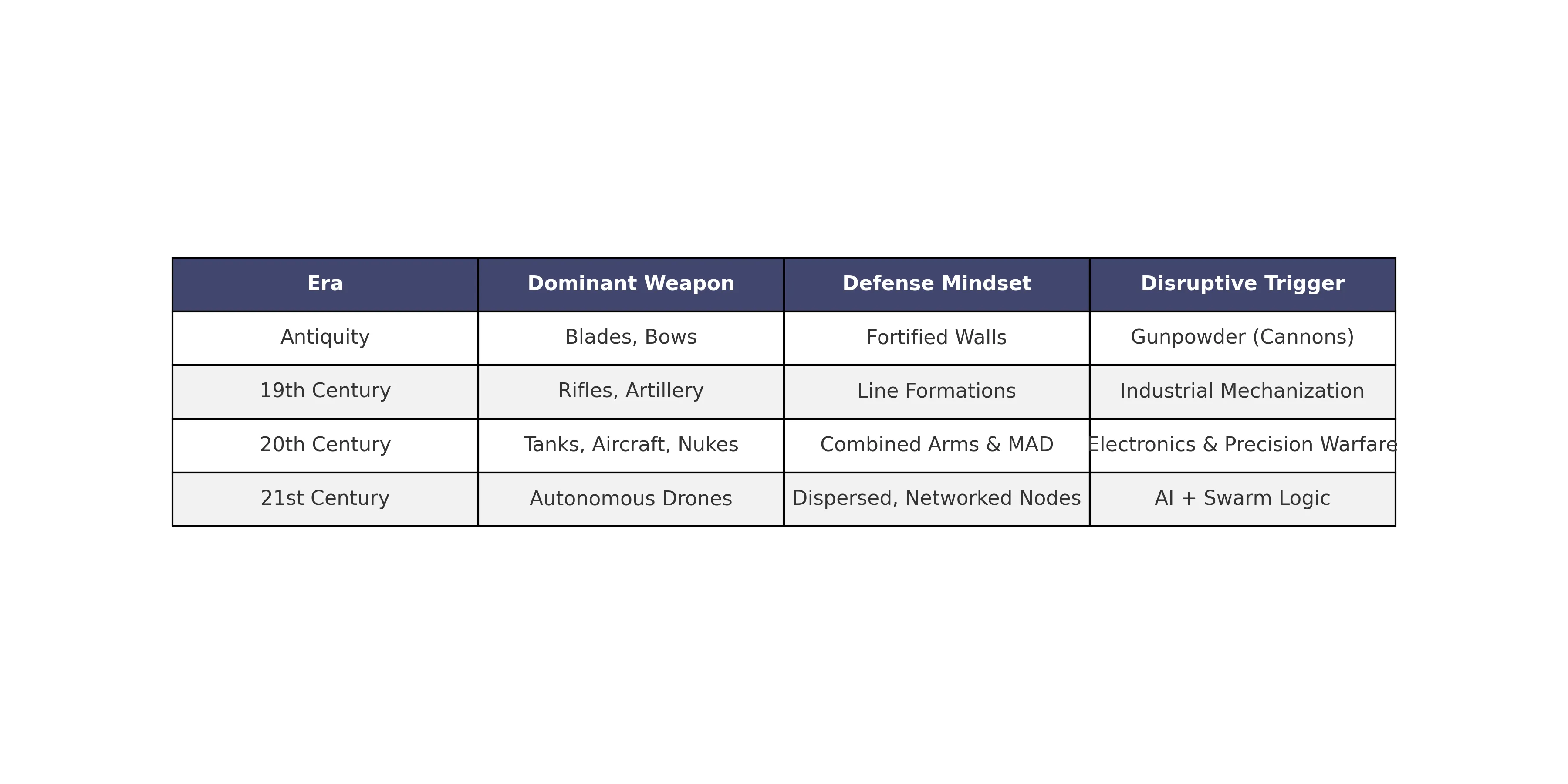“Just as cannons ended the age of castles and rifles redefined infantry, drone swarms are rewriting the rules of modern war.”
— HybridSec
✴️ Drone Swarms: A Gunpowder-Scale Revolution
We are witnessing a pivotal transformation in warfare. Not a mere tactical innovation—but a paradigm shift on par with the introduction of gunpowder, rifles, or nuclear weapons.
Autonomous drone swarms—small, fast, intelligent, and cheap—are reshaping not only how battles are fought, but how war is imagined. This isn’t just new firepower; it’s a new logic of war.
🧠 Comparative Evolution of Warfare
Let’s place drone swarms in historical context:
| Era | Dominant Weapon | Defense Mindset | Disruptive Trigger |
|---|---|---|---|
| Antiquity | Blades, bows | Fortified walls | Gunpowder (cannons) |
| 19th Century | Rifles, artillery | Line formations | Industrial mechanization |
| 20th Century | Tanks, aircraft, nukes | Combined arms & MAD | Electronics & precision warfare |
| 21st Century | Autonomous drones | Dispersed, networked nodes | AI + Swarm logic |

Each shift rendered previous tactics obsolete. Cannons demolished castles. Rifles out-ranged spears. Nuclear deterrence restructured geopolitics. Drone swarms now threaten to upend traditional force structures the same way.
🛰️ What Makes Drone Swarms Revolutionary?
1. Decentralized Lethality
Swarm logic distributes decision-making and movement across dozens—or hundreds—of autonomous units. There’s no single command node to target. Defenders face a “cloud of chaos” that adapts on the fly.
2. Cheap Offense vs Expensive Defense
A $500 FPV drone can disable a tank or surveillance post. Defensive systems designed to shoot down aircraft or missiles often can’t respond economically or fast enough to swarms.
3. AI-Guided Adaptation
Swarms can shift formations, select targets, or reroute missions mid-flight, guided by machine learning and sensor feedback. This turns every drone into an intelligent agent in a hive network.
4. New Logistics & Production Models
Drones can be 3D-printed near the battlefield. They don’t require costly pilot training or hardened infrastructure. This favors agile actors and insurgent-style logistics over industrial-era militaries.
⚔️ Strategic Implications
🛡️ Air Defense Must Be Rethought
Legacy air defense systems—radar-guided missiles, SAMs—weren’t designed for dozens of tiny, fast, erratic targets attacking simultaneously. Counter-swarm defense will require its own form of automation.
🚛 Supply Chain Becomes a Weapon
Nations with the ability to produce, iterate, and deploy drones rapidly will dominate future conflicts. We’re moving from single exquisite platforms to mass-producible, upgradable combat bots.
🪖 Infantry Evolves Into Tactical AI Coordinators
Frontline soldiers become commanders of digital assets—controlling recon drones, calling for precision strikes, and receiving real-time data from autonomous sensors.
⚠️ Ethical & Strategic Dilemmas
With great autonomy comes great risk:
- Who’s accountable for the actions of AI-guided swarms?
- Will swarm-on-swarm combat become the norm—or simply escalate faster than humans can respond?
- Could drone proliferation become harder to control than nuclear weapons?
These questions are not theoretical. Ukraine has already launched multi-drone swarm strikes on Russian airbases. China and the U.S. are developing doctrine and countermeasures in real time.
🧩 Hybrid Warfare’s Perfect Weapon
Drone swarms excel in the gray zone between war and peace:
- Covert infrastructure strikes
- Border incursions with plausible deniability
- Disruption of radar, power, or communications
In short, swarms are hybrid warfare’s perfect instrument: scalable, deniable, autonomous, and cheap.
🧭 Conclusion: A Tactical Horizon Redefined
We are entering a new epoch where autonomy + mass replaces precision + scarcity.
Just as muskets democratized firepower in the 18th century, drone swarms democratize strategic disruption in the 21st.
To prepare for the battlefield of tomorrow, we must do more than upgrade our tools.
We must upgrade our doctrine, ethics, and imagination.
“It’s not just about what drones can do—
It’s about how we fight when drones are doing it.”
— HybridSec
Share this article

yankee0one
Former documentary junky turned pilot, turned sailor, turned cyborg
Related Articles

Geopolitics in 2025: Fragmented Alliances and Security in Flux
A 2025 perspective on the rapidly evolving geopolitical order, driven by tech rivalries, regional assertiveness, and new security paradigms.
Read more
The Shifting Geopolitical Landscape: New Alliances and Security Challenges
An analysis of emerging geopolitical realignments and their implications for national security strategies in an increasingly multipolar world.
Read more